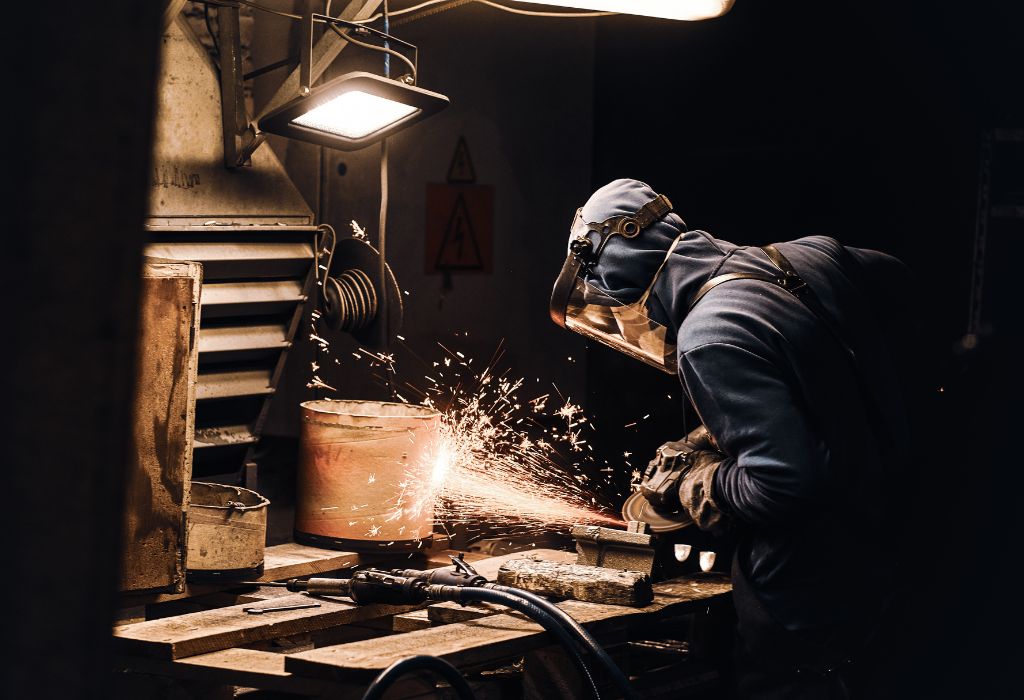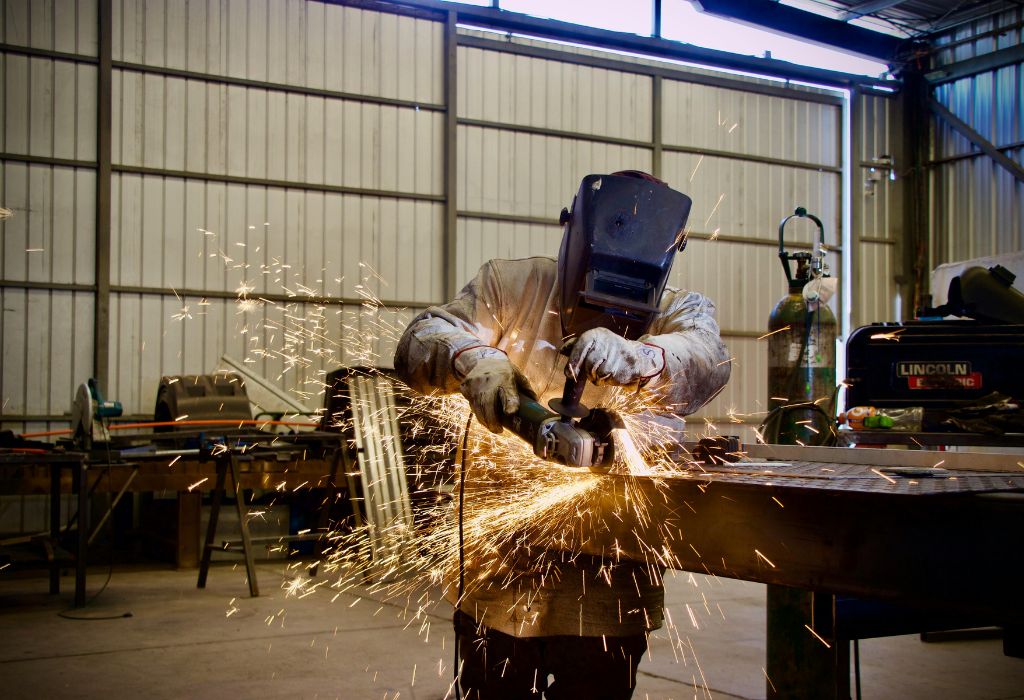A welder stands inside a shipyard, helmet down, sparks flying as steel meets steel under strict supervision. The work is slow, deliberate, and must meet the highest standards.
Many welders dream of reaching this level, where their skills are trusted for jobs in nuclear plants, submarines, or defense projects. The path is difficult, but the rewards are high.
Unlike general welding, nuclear welding requires advanced training, strict testing, and government-approved certifications. Each weld must pass inspections that leave no room for error.
The average welder in the United States earns $48,940 per year, but nuclear welders often exceed $70,000 annually thanks to the precision and responsibility of the role source.
The U.S. Energy Information Administration reports that nuclear energy produces about 19% of the nation’s electricity, making certified nuclear welders critical for energy security source.
This guide explains how to become a nuclear welder step by step, covering requirements, certifications, training, pay, and career outlook.
What Is a Nuclear Welder?

Nuclear welders are specialists who join, repair, and inspect components in nuclear facilities. Their work supports power plants, naval ships, and defense projects.
Unlike standard welding, every weld must comply with ASME Section IX, AWS, and NRC regulations. Precision and safety dominate every task.
What does a nuclear welder do?
They weld high-pressure pipes, vessels, and reactor parts.
How is it different from regular welding?
The work requires advanced codes, inspections, and security protocols.
Do nuclear welders only work in power plants?
No, they also work in shipyards, aerospace, and defense.
Is nuclear welding dangerous?
Risks exist, but strict radiation and safety controls protect workers.
Is nuclear welding in demand?
Yes, due to plant maintenance, naval projects, and new energy needs.
Core Requirements to Become a Nuclear Welder
Becoming a nuclear welder requires a foundation in welding plus advanced qualifications. Sponsors and employers expect several years of prior welding experience.
Applicants must hold a high school diploma or GED and often need to pass drug screens, physicals, and background checks.
Do you need prior welding experience?
Yes, typically 3–5 years before applying for nuclear codes.
Do you need a degree?
Not required, but trade school or apprenticeships help.
Is security clearance required?
Yes, especially for naval or defense work.
Can beginners apply directly?
No, nuclear welding is for advanced, certified welders.
What is the first step?
Start with general welding training and certifications.
Nuclear Welding Certifications and Codes
Nuclear welders must pass code tests and certifications recognized by AWS, ASME, and the NRC. The most important code is ASME Section IX for welding qualifications.
Non-destructive testing (NDT) methods such as X-ray and ultrasonic inspection are required for every weld. The N stamp identifies approved nuclear fabricators.
Which certifications are mandatory?
ASME Section IX performance qualifications.
Who oversees nuclear certifications?
AWS, ASME, and NRC for regulatory compliance.
Is the N stamp required?
Yes, for contractors fabricating nuclear components.
Do welders need recertification?
Yes, welders must maintain continuity logs and retests.
Is NDT part of the process?
Yes, every nuclear weld undergoes NDT inspections.
Training Path: From Welder to Nuclear Specialist
The journey begins with basic welding education through school or apprenticeship. After several years of experience, welders apply for advanced nuclear code training.
This process often includes additional classroom work in metallurgy, safety, and blueprint reading. Candidates then attempt rigorous nuclear welding performance tests.
How long does it take?
Usually 4–6 years including training and work experience.
Can military welders transition quickly?
Yes, Navy welders often qualify due to specialized training.
Do unions sponsor nuclear training?
Yes, unions like Boilermakers and Pipefitters offer programs.
Is classroom study required?
Yes, nuclear codes require technical study.
Do all welders pass nuclear tests?
No, the failure rate is high due to strict standards.
Skills Needed to Succeed
Success in nuclear welding requires more than technical ability. Welders need attention to detail, safety awareness, and the ability to follow codes precisely.
Knowledge of metallurgy, blueprint reading, and NDT basics is essential. Soft skills like patience, discipline, and teamwork are equally important.
Is math important?
Yes, for tolerances, measurements, and calculations.
Do you need blueprint reading skills?
Yes, nuclear work relies on detailed blueprints.
Are soft skills valuable?
Yes, employers demand reliability and discipline.
What about physical stamina?
Yes, confined and hot work environments are common.
Is teamwork essential?
Yes, welders work alongside inspectors and engineers.
Career Opportunities for Nuclear Welders
Nuclear welders find work in power plants, naval shipyards, aerospace projects, and defense contractors. Opportunities exist both in the U.S. and abroad.
Travel is often part of the job, especially during plant outages or ship overhauls. Contractors regularly seek nuclear-certified welders for high-paying short-term assignments.
Where do most nuclear welders work?
Power plants and naval shipyards.
Can you work internationally?
Yes, if certified under global codes.
Do contractors hire nuclear welders?
Yes, for temporary and long-term projects.
Is travel required?
Often, especially for outage projects.
Are jobs permanent or contract-based?
Both, depending on employer needs.
Salary and Job Outlook
Nuclear welders are among the highest-paid welders in the industry. Pay varies by sector, but overtime and travel contracts increase earnings significantly.
The average nuclear welder salary exceeds $70,000 per year, with some defense and shipyard welders making six figures with overtime.
What is the average salary?
Over $70,000 annually, with potential for more.
Do union jobs pay more?
Yes, unionized work includes benefits and pensions.
Are jobs stable?
Yes, maintenance ensures steady demand.
Where is demand highest?
Shipyards, energy hubs, and defense projects.
Is overtime available?
Yes, outage projects often include overtime.
Challenges and Risks in Nuclear Welding

Nuclear welding comes with physical, technical, and psychological challenges. Welders must pass strict inspections and work under constant oversight.
Radiation safety, confined spaces, and heavy PPE add to job difficulty. Yet the strict controls ensure worker safety.
Is radiation a risk?
Yes, but exposure is controlled with monitoring.
Is testing difficult?
Yes, nuclear welding has one of the highest failure rates.
Do welders face physical strain?
Yes, long hours and tough environments are common.
Is it worth it?
Yes, pay and prestige make it rewarding.
Can mistakes happen?
Rarely, as strict inspections catch errors quickly.
Steps to Apply for Nuclear Welding Jobs
Nuclear welders apply through contractors, unions, or shipyards. Applicants must provide résumés, certifications, and references.
Testing is performed at approved facilities, and candidates may also undergo background or security clearance checks.
Where do you apply?
Shipyards, contractors, and nuclear utilities.
Do you need references?
Yes, previous supervisors or trainers are required.
Do you need clearance upfront?
Not always, but eligibility is necessary.
Are tests conducted onsite?
Yes, usually at employer facilities.
Should you prepare a portfolio?
Yes, including certifications and weld samples.
Conclusion
Becoming a nuclear welder is one of the most demanding paths in the trade. It requires years of training, certifications, and strict testing.
With ASME Section IX, AWS certifications, and NRC compliance, nuclear welders earn some of the highest wages in the industry.
The career is challenging but offers prestige, security, and pay that reflect the skill and responsibility required. For welders seeking the top of the profession, nuclear welding is the ultimate goal.

I’m Darrell Julian, the founder, lead writer, and hands-on welding enthusiast behind ArcWeldingPro.com. With more than 15 years of real-world welding experience, I created this platform to share what I’ve learned in the field, in the shop, and in the heat of the arc.


